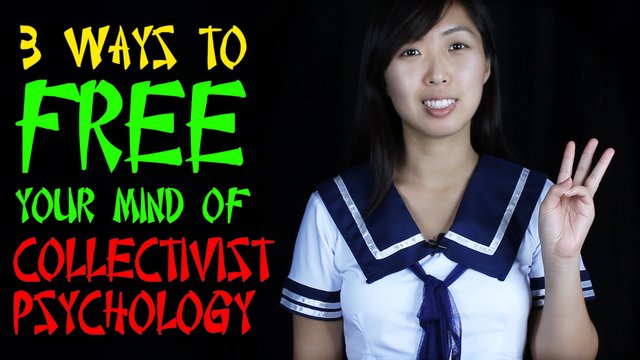3 Ways to Free your Mind from Collectivist Psychology

I discuss 3 common collectivist communication habits people have with some examples of how to break them.
If you want to be a better communicator for liberty, I highly recommend:
Nonviolent Communication by Marshall B. Rosenberg
https://amzn.to/2LshIYE
Argumentation Ethics and Liberty: A Concise Guide:
https://mises.org/library/argumentation-ethics-and-liberty-concise-guide
Avoiding synecdoche when describing specific actors.
Synecdoche is a figure of speech in which a whole is represented by a part of it or vice versa. For example, saying that New York won last night is sometimes used to describe a win by a sports team like the Yankees or Giants.
While synecdoche is not automatically harmful as a literary technique, it becomes harmful when it is used to mask the violent or unethical actions of others.
For example, saying “The rich are stealing our money!” generalizes the acts of cronyism by a few to all rich people, roping in those who have nothing to do with government collusion for theft.
Saying, “The Chinese are out to get us!” collectivizes the intent of diverse people, who may or may not have any intention of harming others.
Instead of speaking with synecdoche, you can clarify your thinking by narrowing in on who and what is responsible for specific actions.
For example, instead of saying, “The United States attacked Syria,” you could say that a drone bomb was launched with approval from the president that lead to the death of Syrian children.
Thinking about who is actually responsible for what actions will help you hone in on cause and effect and become a more effective thinker and communicator.
Avoiding collective pronouns like “we” and “our” to describe actions you have nothing to do with.
Using pronouns like “we” and “our” is often a habit that many have developed due to public school history classes, which indoctrinate captive young people into thinking they are integral to the system of rule while they are simultaneously stripped of their independence in body and property rights.
For example, many will use the phrase, “We the people,” when describing government, when the public at large does not really have any say or control with the state, as is evidenced by the wide population gap between those who actually make the rules versus those who don’t.
When tempted to use “we,” or “our” take a step back and ask yourself the following three questions:
- Am I actually a member of this group I am speaking about?
- Did I actually participate in the actions I am speaking about?
- Do I actually have control over the system/management of what I am talking about?
When you do this, you are able to take responsibility for your own actions without blame-shifting, whether it’s improperly giving yourself credit for something you had nothing to do with, or blaming others for actions they had nothing to do with.
Undoing all-or-nothing thinking.
All-or-nothing thinking is a critical stumbling block for many in trying to understand their actions and others’. The reason that people often struggle with thinking outside of generalizations of “all good” or “all bad” because it can be painful and tedious to dissect the sum of a person’s or organization’s actions.
Coloring someone or something as “all good” or “all bad” is especially prevalent when someone does not have an argument.
For example, when I critique foreign policy, instead of discussing the cause and effects, someone may respond with: “If you don’t like it here in America, why don’t you move to Somalia, you evil traitor!”
Here, the person responding to my critique was unable to process why I was making that critique so, instead, they labeled me as an evil person worthy of death.
Undoing all-or-nothing thinking requires getting to the root of someone’s concerns and asking about the “whys” of what they think and how they came to think that way.
Instead of calling names and painting others with broad strokes, think about how you can better articulate your views with reason and evidence.
When you do, you will be better able to understand how you think, how others think, and how accurate your perceptions of reality are.
▀▀▀▀▀▀▀▀▀▀▀▀▀▀▀▀▀▀▀▀▀▀▀▀▀▀▀▀▀▀▀▀▀▀▀▀▀▀▀▀▀▀▀▀▀▀▀
Philosophy is my core. Reason is my foundation. Phở is my sustenance.
~Connect with me :{D
∀ Facebook - https://www.facebook.com/dapholosopher
∀ Twitter - https://twitter.com/DaPholosopher
∀ Steemit - https://steemit.com/@thepholosopher
∀ YouTube - https://www.youtube.com/thepholosopher
∀ Instagram - https://www.instagram.com/pholosopherofficial/
∀ Minds - https://www.minds.com/thepholosopher
~Help me afford more Phở (ノ◕ヮ◕)ノ*:・゚✧
∀ Patreon - https://www.patreon.com/thepholosopher
∀ Crypto - https://thepholosopher.com/support/
∀ Liberty Tees - https://www.libertariancountry.com/?rfsn=639897.fb3ec
∀ More Liberty Tees - https://www.rageon.com/a/users/voluntaryist
▄▄▄▄▄▄▄▄▄▄▄▄▄▄▄▄▄▄▄▄▄▄▄▄▄▄▄▄▄▄▄▄▄▄▄▄▄▄▄▄▄▄▄▄▄▄▄

That was a nice little read to get the day started. I wonder if you'd agree that sometimes inferring an entire group is responsible for certain outcomes can be the correct determination? For instance, "All order followers (those who do not take their own ethics and morals into account) before they act are bad people."
Thank you for the post, have a Phontastic day.